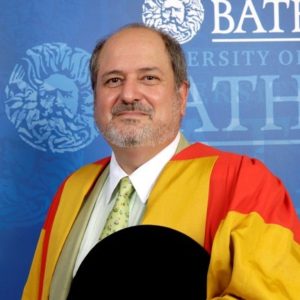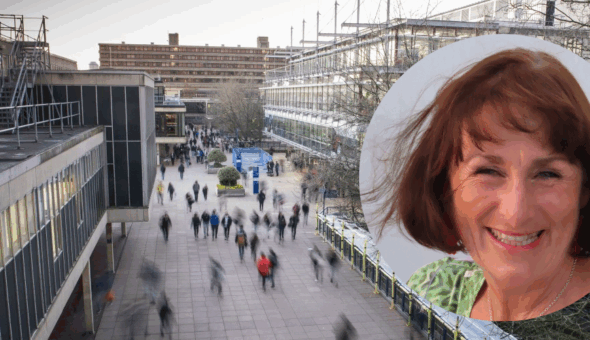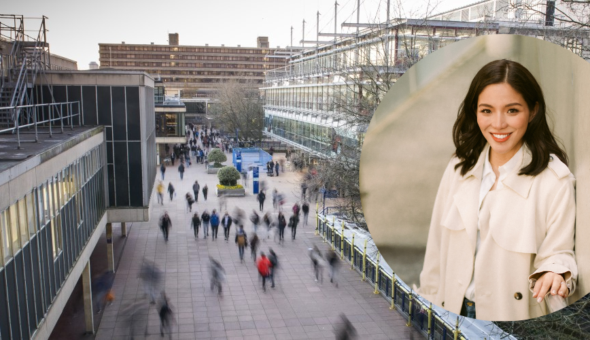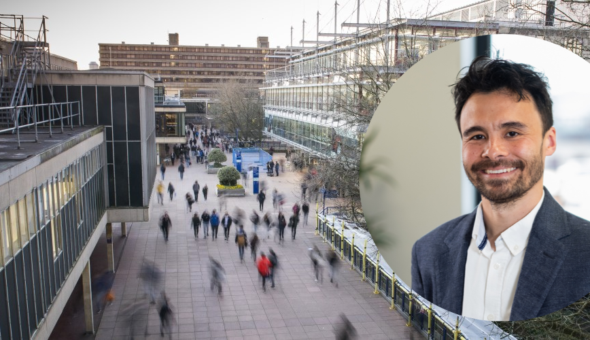Professor Raymond Schinazi is a scientist whose research focuses on developing treatments for life-threatening viruses. He’s widely recognised for his contributions in the fields of HIV and hepatitis B. In fact, more than 94% of HIV-infected individuals take at least one of the drugs he invented.
Raymond is currently an Emory University Professor and was awarded France’s highest honour in recognition of his pioneering work. Here, Raymond shares his inspiring journey, memories of Bath and his advice to the next generation of researchers.
 How did your studies help to prepare you for your future career as a scientist?
How did your studies help to prepare you for your future career as a scientist?
I'm very grateful to have studied chemistry at Bath. It was a sandwich course with two six-month placements. The first was at Unilever Research Laboratory in Isleworth where I did a study on improving toothpaste, believe it or not!
On my second placement I was able to work in France. This was the time of Concorde, and Toulouse was one of the centres where the aircraft was being built. I was looking at how to apply sulphur chemistry to chemical processes and to biology. I was also very fortunate to practise my French.
I think the sandwich courses differentiated us from all the other universities in the UK at the time. Placements are a great thing in any discipline because you get some real life experiences.
Did you have a particular career in mind when you chose to study chemistry?
I had an uncle who was a famous herpes virologist in the US, and I wanted to be like him. But I think it started even earlier than that – when my mother was very sick. The treatment was a simple drug that you probably have in the lab right now in Bath, but at the time in Egypt you couldn't find one milligram of the compound. We got the drug from the US and miraculously she completely recovered and lived to be 94 years old, thanks to this medicine.
That had a big impact on me as a child. I wanted to be the guy behind that pill, who discovered it and actually made it. I could save people's lives and work on real problems. And HIV turned out to be a very big problem, followed by hepatitis B and C. Now it’s Covid-19 and monkeypox, so there's a lot more work to be done.
Your virology research already has an incredible legacy. What does it feel like to know that your work is directly benefiting so many people around the world every day?
You don't become a scientist because you want to be famous or rich. You want to do it because you are passionate about science but you have no idea how impactful your work is going to be.
You try to find solutions to problems and sometimes – with a lot of hard work, intuition, study and experience – you develop something that cures a disease, for example. Very few people can say that, but we actually did it. You get rewarded with fame but also monetarily, and then you can use that fame to do more and more research, and you can give more to charity, which is what I've done also.
You've been very generous in supporting research leaders and early-career academics. How important it is to you to be able to support academics doing innovative research, as well as the next generation of researchers at Bath?
I came to the UK as an immigrant from Egypt to benefit from a British education, and I'm very grateful to Britain for that reason. Giving back is so important in my religion and the way I interpret it is through charity. There's an ethical obligation to give back if you can.
I was very fortunate to get a scholarship at a school in England to do both my O and A-levels. I think it’s so important to support underprivileged, bright students – especially those who are immigrants or have been displaced because of war – and give them an opportunity to study at Bath. I’m very proud to have helped.
Our new Department of Life Sciences will build on our research excellence and put us in the best position to respond to global challenges in areas such as health. What qualities do you think are vital in the next generation of researchers, and what advice do you have for the leaders of tomorrow?
I think perseverance is key. Ethics are also very important, but you still have to push hard because nobody is going to pat you on the back and nobody's going to push you. You have to push yourself like athletes do. It’s the same principle.
You will fail; you will hit a brick wall sometimes, but you’ve got to continue. Go out and meet people. Don't sit in front of your phone screen all day long. I think it's important to interact with people and exchange ideas because that's where things happen.
There's so much talent out there: it's a matter of connecting brains and mingling with people outside your own discipline. It's very important to diversify your knowledge, to know what else there is out there, because that's how the ideas will form.
How did you come to develop some of the most widely used treatments for HIV?
I moved from Yale to work at Emory University on herpes viruses. There are similarities among different viruses, usually they're either RNA or DNA. HIV is basically a cross between the two – nobody even knew it was a virus when people developed the symptoms and became emaciated. But when we found out it was a virus causing AIDS, we were very well-equipped to tackle the problem and came up with drugs very quickly.
Probably the most famous thing we've done is to make L-nucleosides, which are basically mirror images of natural nucleosides. The L form was usually thought to be inactive until we found out that they are activated in HIV-infected cells, get incorporated into the virus genome selectively and cause havoc to the virus replication cycle.
There was a bit of serendipity too. Nobody previously had looked at this class of compound, and we were able to have a tremendous breakthrough. This was totally novel at the time and was very, very impactful. Today, more than 94% of the people who have HIV worldwide take one of my drugs, which just happens to be L-nucleoside analogs in combination with other antiretroviral agents.
What are you working on in your lab right now?
Things are constantly changing, but we move fast. The monkeypox outbreak only began a few weeks ago and we got the virus – it's a good start. Our lab has Biosafety Level 3, which is close to the highest level of safety, and we have already begun to grow the virus and find newer antivirals and develop better diagnostics, because that's a pressing problem.
We're working on Covid, too, as well as other emerging viruses. There are plenty of viruses out there so which one should you choose? Which one do you think is most likely to cause another pandemic? That's where I think my work is going towards.
When you think back to your time as a student at the University of Bath, what sort of images conjure up in your mind?
Happy moments. Happy times. I wasn't into sports, but occasionally we had cricket matches – faculty versus students.
I remember the chairman of chemistry, I think his name was Dr Stone, and they put me as a bowler for him. I'm terrible at cricket; I'm a disaster. They put me in on purpose because they thought he should be able to knock me for six.
It was a beautiful summer day by the lake. I threw the ball and the chairman hit it, looking like he was ready to show the world how wonderful he was. I caught it with my right hand and got him out. And then everybody in my group said to drop the ball!
I didn't drop it, and I think this is one of the most vivid memories – of the beautiful space by the lake, playing cricket with the faculty and the postdoctoral fellows. We literally had a ball!
Respond



